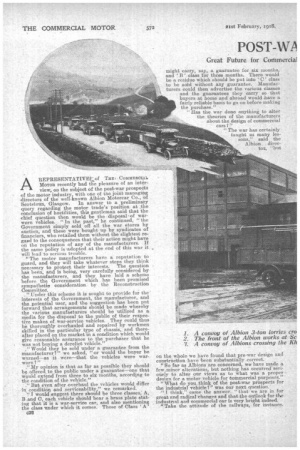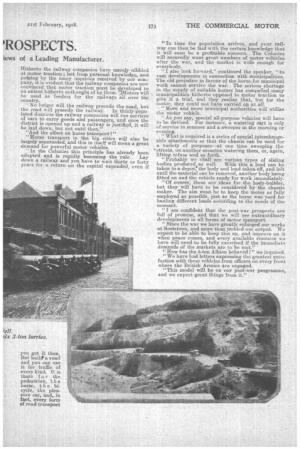POST-WA 'ROSPECTS.
Page 10

Page 11

If you've noticed an error in this article please click here to report it so we can fix it.
Great Future for Commercial iews of a Leading Manufacturer.
AREPRESENTATIVEtof THE,. COMMERCIAL MOTOR recently bad the pleasure of an interview, on the subject of the post-war prospects of the motor industry, with one of the joint managing directors of the well-known Albion Motorcar Co., of Scotstoun, Glasgow. In answer to a preliminary query regarding the motor trade's position at .the conclusion of hostilities, this gentleman said that the chief question then would be the disposal-of warworn vehicles. "In the past," he continued, " the Government simply sold off all the war stores by auction, and these were bought up by syndicates of financiers, who retailed them without the slightest regaad to the consequences that their action might have on the reputation of any of the manufacturers. If the same policy is 'adopted at the end of this war it will had to serious trouble.
"The motor manufacturers have a reputation to guard, and they will take whatever steps they think neeassary to protect their interests. The question has been, and is being, very carefully considered by the manufacturers, and they have laid a scheme before the Government which has been promised sympathetier consideration by the Reconstruction Conamittee. _ ," Under this scheme it is sought to provide for the interests of the Government, the manufacturer, and the potential user, and the suggestion has been put forward that arrangements should be made whereby the various manufacturers should be utilized as a Media for the disposal to the public of their respective makes of war-service vehicles. They could thus be thoroughly overhauled and repaired by workmen skilled in the particular type of chassis, and thereafter placed on the market in a condition which would give reasonable assurance to the purchaser that he
I WAS not buying a derelict vehicle."
." Would they be sold under a guarantee from the manufacturer ?" we asked, "or would the buyer be warned—as it were—that the vehicles were warWorn ? "
.." My opinion is that as far as possible they should be offered to the public under a guarantee—one that ay-wild extend from three to six months, according to the condition of the vehicle."
." But even after overhaul the vehicles would differ iii_ condition and serviceability," we remarked. " T would enggest there should be three classes; A, Band 0,each vehicle should bear a brass plate stat
ing that it is a war-service ear, and also mentioning the class under which it comes. Those of Class ' A ' c32 might carry, say, a guarantee for six months, and ' B ' class for three months. There would be a residue which should be put into 'SO' class to be sold without any guarantee. Manufacturers could then advertise the various classes and the guarantees they carry BO that buyers at home and abroad would have a fairly reliable basis to go on before making the purchase."
" Has the war done anything to alter the theories of the manufacturers about the design of commercial Cars?"
"The war has certainly taught us many lessons." said the Albion direc toe, "but on the whole we have found that pre-war design and construction have been substantially correct.
"So far as Albions are concerned, we have made a, few,ininoralterations., but nothing has occurred seriously to alter our views as to what was a proper desian for a motor vehicle for commercial purposes."
"What do you think of the post-war prospects for the inclastrial vehicle?" was our next question. "I think," came-the answer. "that we are in for great and radical changes and that the outlook for the industrial and commercial ear is very bright indeed. "Take the attitude of the railways, for instance. Hitherto the railway companies have merely nibbled at motor traction ; but from personal knowledge, and judging by the many inquiries received by our company, it is evident that the railway companies are now convinced that motor traction must be developed to an extent hitherto unthought of by them.1Nfotors will be used as feeders for the railways all over the country.
No longer will the railway precede the road, but the road will precede the railway. In thinly-populated districts the railway companies will run services of ears to carry goods and passengers, and once the district is opened up and a railway is justified, it will be laid down, but not until then." "And the effect on horse transport ?" "Horse transport in the big cities will also be largely superseded, and this in itself will mean a great demand for powerful motor vehicles.
" In the Colonies this principle has already been adopted and is rapidly becoming the 'rule. Lay down a railway and you have to wait thirty or forty years for a return on the capital expended, even if
you get it then. But build' a road and you can use it for traffic of every kind. It is there f o r the pedestrian, t h o horse, t h e bicycle, the pleasure car, and, in fast, every form of road transport
"In time the population arrives, and your railway can then be laid with the certain knowledge that it will soon be a profitable concern. The Colonies will assuredly want great numbers of motor vehicles after the war, and the market is wide enough for everybody. "I also look forward," continued the speaker, "to vast developments in connection with municipalities. The old prejudice in favour of the horse for municipal work cannot survive the war. The serious shortage in the supply of suitable horses has compelled many municipalities hitherto opposed to motor traction to give it a trial, and they realize that, but for the motor, they could not have carried on at all. "More and more municipal authorities will utilize the motor vehicle.
"As you say, special all-purpose vehicles will have to'be devised. For instance, a watering cart is only of service in summer and a sweeper in the morning or evening.
"What is required is a series of special interchangeable attachments so that the chassis can he used for a variety of purposes—at .one time sweeping the -streets, on another occasion watering them, or, again, lifting refuse and so forth.
"Probably we "hail -see various types of sliding bodies produced as well. With this a load can be taken to a depot, the body and load taken off, and left until the material can be removed, another body being fitted on and the vehicle ready for work immediately.
"Of course, these are ideas for the body-builder, but they will have to be considered by the chassis maker. The aim must be to keep the motor as fully employed as possible, just as the horse was used for hauling different loads aecording to the needs of the moment.
"I am confident that the post-war prospects are full of promise, and that we will see extraordinary developments in all forms of motor transport.
"Since the war we have greatly enlarged our works at Scotstoun, and more than trebled our output. We expect to be able to keep this up, and improve on it when peace comes, and every available resource we have will need to ke fully exercised if the immediate demands of the markets are to be met."
"How has the 3-ton Albion behaved?" we inquired.
"We have had letters expressing the greatest satisfaction with these vehicles from officers on every front where the British Armies are engaged.
"This model will be on our post-war programme, and we expect great things from it."






















